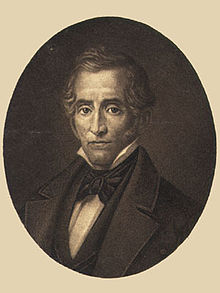Edward Douglass White senior
Edward Douglass White senior (March 3, 1795 in Maury County , Southwest Territory , † April 18, 1847 in New Orleans , Louisiana ) was an American politician and from 1835 to 1839 governor of the state of Louisiana. He was also a member of the US House of Representatives .
Early years and political advancement
Edward White and his father, former Congress delegate James White, came to what is now St. Martin Parish in Louisiana in 1799 . There he attended public schools. Then he returned to Tennessee, where he studied at what was then the University of Nashville until 1815 . After studying law, he began working as a lawyer in Donaldsonville .
Between 1825 and 1828, White was a judge in a New Orleans city court. Between 1829 and 1834 he represented his state in the US House of Representatives in Washington . On July 7, 1834, he was elected governor of his state as a Whig Party candidate . Thereupon he resigned his mandate in Congress .
Louisiana Governor
White took up his new post on February 2 as the successor to André Bienvenu Roman , who would also be his successor four years later. During his four-year tenure, gas-powered street lighting was introduced in some cities in the state. It was then that the Medical College of Louisiana was founded and import duties on sugar were released. This was to protect the local sugar industry. Since 1837, Louisiana has also been hit by the economic crisis of that time.
Another résumé
White's tenure ended on February 4, 1839. He was then re-elected as a member of Congress for two terms. He was there between March 4, 1839 and March 3, 1843. He then worked as a lawyer and planter . Edward White senior died in 1847. He and his wife Catharine Sidney Ringgold had five children, including their son Edward Jr. , who was US Senator between 1891 and 1894 and US Supreme Justice from 1910 to 1921 .
Web links
- Edward White in the National Governors Association (English)
- Edward Douglass White in the Biographical Directory of the United States Congress (English)
- Edward Douglass White senior in the database of Find a Grave (English)
- The Governors of Louisiana (English)
| personal data | |
|---|---|
| SURNAME | White, Edward Douglass Sr. |
| BRIEF DESCRIPTION | American politician |
| DATE OF BIRTH | March 3, 1795 |
| PLACE OF BIRTH | Maury County , Louisiana |
| DATE OF DEATH | April 18, 1847 |
| Place of death | New Orleans , Louisiana |


